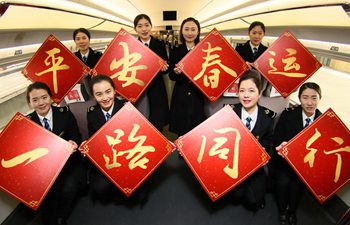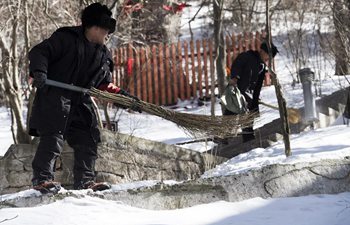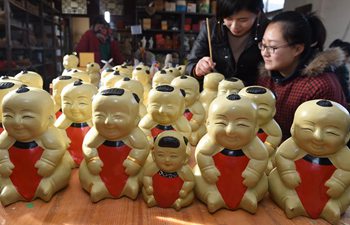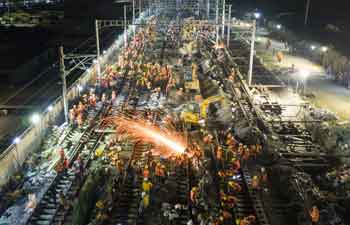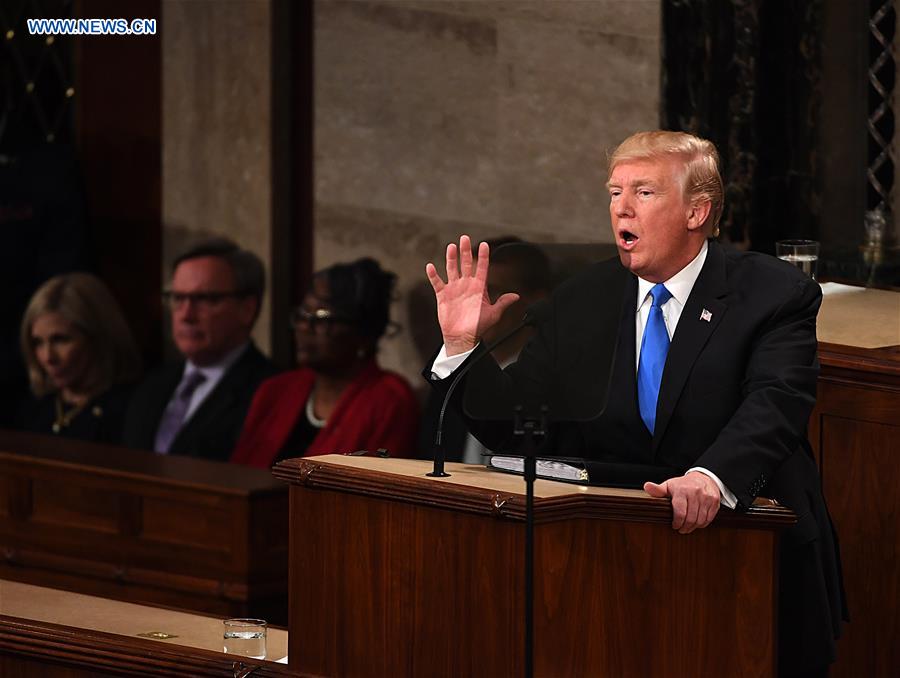
U.S. President Donald Trump delivers his State of the Union address to a joint session of Congress on Capitol Hill in Washington D.C., the United States, Jan. 30, 2018. (Xinhua/Yin Bogu)
WASHINGTON, Jan. 30 (Xinhua) -- U.S. President Donald Trump on Tuesday highlighted the anti-terrorism fight and foreign aid policy in his first State of the Union address.
Trump said he had signed an order to reexamine the U.S. military detention policy and to keep open the detention facilities at Guantanamo Bay.
"In the past, we have foolishly released hundreds and hundreds of dangerous terrorists, only to meet them again on the battlefield -- including the ISIS leader, (Abu Bakr) al-Baghdadi, who we captured, who we had, who we released," Trump said, referring to the terror group by its other name, the Islamic State of Iraq and Syria.
"So today, I am keeping another promise," he said.
The president pledged to continue the anti-terrorism fight until the Islamic State (IS) was defeated. "When possible, we have no choice but to annihilate them. When necessary, we must be able to detain and question them. But we must be clear: Terrorists are not merely criminals. They are unlawful enemy combatants. And when captured overseas, they should be treated like the terrorists they are," Trump said.
"I am also asking Congress to ensure that in the fight against ISIS and al-Qaida, we continue to have all necessary power to detain terrorists, wherever we chase them down, wherever we find them," he said.
"In many cases, for them, it will now be Guantanamo," Trump said.
Only 41 detainees now remain in the facility after hundreds of inmates were transferred to sites in the United States or sent to their home countries under President Barack Obama, who failed to close the prison center.
Critics say the center, set up in 2002 as part of the U.S. war on terror, has been plagued by the use of torture to extract confessions.
Trump also asked Congress to pass a legislation to "help ensure American foreign-assistance dollars always serve American interests, and only go to friends of America."
Citing the UN General Assembly vote on Dec. 22 against his controversial Jerusalem decision, Trump said "American taxpayers generously send those same countries billions of dollars in aid every year."
The vote came on the heels of Trump's announcement on Dec. 6 that he decided to recognize Jerusalem as the capital city of Israel and move the U.S. embassy from Tel Aviv to Jerusalem.
In his speech, Trump also lashed out at Iran, Cuba, Venezuela and the Democratic People's Republic of Korea, calling them "adversaries".
The president not only urged Congress to address the "fundamental flaws" in the Iran nuclear deal, but also defended his "maximum pressure" campaign against Pyongyang's nuclear development project.
Darrell West, a senior fellow at the Washington-based think tank Brookings Institution, said Trump took a tough stance on foreign policy in his speech.
Dan Mahaffee, senior vice president and director of policy at the U.S. Center for the Study of the Presidency and Congress, also said that Trump has "vigorously and assertively defended his record" in terms of foreign policy.




